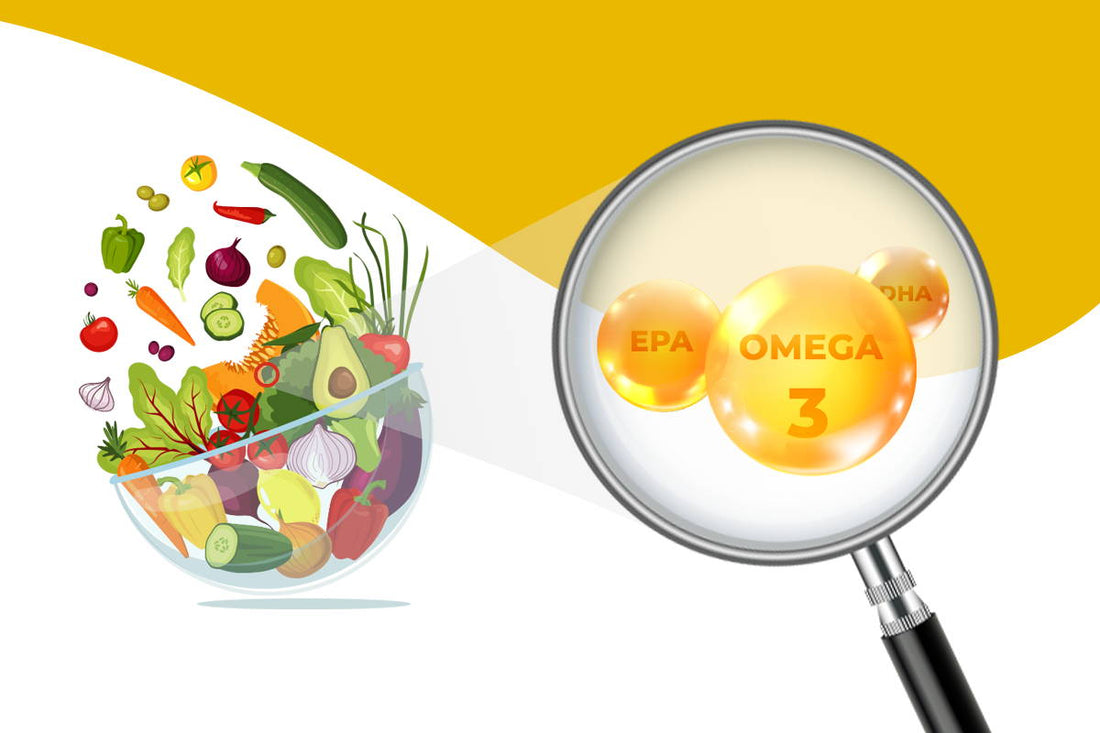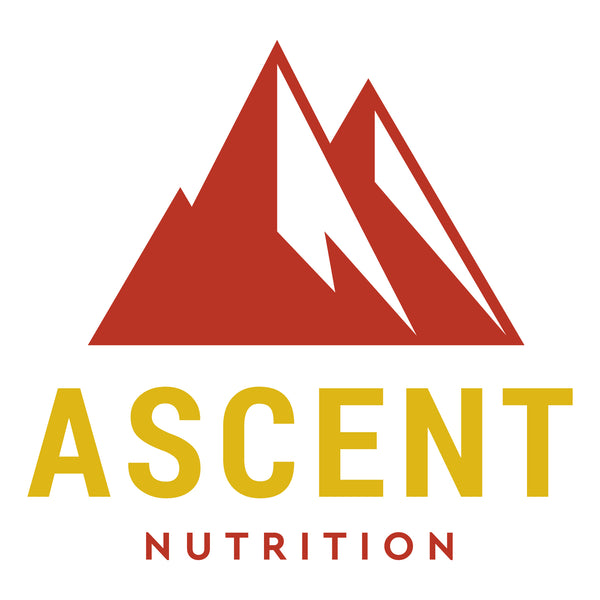Omega-3 fatty acids play a vital role in maintaining our overall health. But for those who follow a vegan or vegetarian diet, obtaining adequate amounts solely from plant-based sources can be challenging. For this reason, this article highlights the best vegan omega-3 sources to support optimal health and well-being.

Best Vegan Omega 3 Supplement – Algae Oil DHA
The Importance of Omega-3s for Health
Omega-3 fatty acids offer several health benefits—making them an important part of any diet. Here are some ways omega-3s help support overall health:
Cardiovascular Health
Staying heart-healthy is of paramount importance to any individual. We should all explore lifestyle changes that can contribute to our cardiovascular well-being. With this in mind, omega-3s have gained significant attention for their potential to support cardiovascular health in multiple ways.
Several studies suggest that omega-3s may help support healthy blood circulation, support healthy triglyceride levels, and promote a healthy cardiovascular system [1] [2] [3].
Brain Health
Omega-3s, especially DHA, are essential for healthy cognitive function and overall brain health. These fatty acids aid in the growth and development of the brain—especially during pregnancy and early life [4].
DHA is an actual structural part of the cellular membranes of each cell and is most concentrated in the neurons and the retina of the eye.
Research also suggests that adequate omega-3 intake may help support a healthy aging process as well as many cognitive processes [5] [6]. In particular, DHA is one of the most important nutrients for brain health due to its beneficial effects on neurogenesis (the process of forming new neurons) and neuroplasticity (the brain's ability to adapt and reorganize itself by forming new neural connections).
Furthermore, omega-3s contribute to the production of vital neurotrophic factors, such as nerve growth factor (NGF), brain-derived neurotrophic factor (BDNF), and Synaptamide (N-docosahexenoyethanolamine)—which promote the survival, development, and function of neurons.
Support a Healthy Inflammatory Response
Besides their cardiovascular and cognitive benefits, omega-3 fatty acids play a crucial role in supporting healthy immune and inflammatory responses [7]. This effect is essential for overall health and well-being. Omega-3’s do this by positively influencing the genetic expression of special enzymes known as COX-2.
Omega-3 DHA for Pregnant and Nursing Mothers
Omega-3 fatty acids, specifically DHA, play a significant role in supporting the cognitive development of both the mother and her developing fetus [4].
Fetal development and growth are heavily influenced by omega-3s. Expectant mothers require sufficient amounts of DHA to support the development of their baby's brain, eyes, and nervous system. When optimal amounts of DHA are reached and maintained, it not only supports basic cognitive needs but also contributes to advanced cognitive development.
Adequate omega-3 intake during pregnancy has also been linked to a reduced risk of preterm birth, underlining the importance of these fatty acids for both mother and child.
Athletic Performance and Recovery
Omega-3 fatty acids may help promote athletic performance and recovery in a number of ways—including supporting a healthy inflammatory response after intense physical activity, promoting mitochondrial health, encouraging muscle protein synthesis (MPS), and supporting essential brain functions (e.g., visual processing, hand-eye coordination, concentration, and memory).
These benefits make omega-3s important for athletic performance and overall fitness, particularly for those engaged in regular exercise or sports activities.
Eye Health
DHA in the rods and cones of the eye's retina plays a vital role in the conversion of photons from the sun into electrical signals that the brain can interpret.
Therefore, omega-3s are crucial for encouraging proper eye function. Ensuring adequate omega-3 intake can contribute to long-term eye health and help maintain visual acuity [8].
Other potential health benefits of omega-3s include promoting a healthy outlook/mood and supporting a healthy immune system [9] [10].
Challenges in Obtaining Omega-3s from a Vegan Diet
The most well-known sources of omega-3 fatty acids are fatty fish like tuna, trout, and salmon. But what if you follow a vegan or plant-based diet? How do you enjoy all the health benefits of omega-3s on a vegetarian diet?
While it is possible to source omega-3 fatty acids from plant-based foods such as chia seeds and flax seeds, vegans and vegetarians face unique challenges in obtaining sufficient amounts.
According to dietary recommendations described in the DHA Regimen (as highlighted by the CEO of Ascent Nutrition, Lance Schuttler), we need 1,000-2,000 mg of DHA and EPA per day to optimally support the nervous system, cardiovascular system, eye health and more.
However, common plant-based sources primarily contain alpha-linolenic acid (ALA), which is not as readily converted by the body as eicosapentaenoic acid (EPA) and docosahexaenoic acid (DHA) [11].
The human body's ability to convert ALA into EPA and DHA is inefficient—with only a small percentage of ALA being converted to DHA (0.5%) and EPA (5%), according to some studies [12].
As EPA and DHA are responsible for many of the key health benefits associated with omega-3s, this limitation creates a challenge for vegans and vegetarians to meet their optimal omega-3 requirements through diet alone.
Given these challenges, it is crucial for those following plant-based diets to seek alternative omega-3 sources that provide EPA and DHA directly. This ensures they can enjoy the full range of health benefits associated with these essential fatty acids without relying solely on their body's conversion of ALA.
Algae Oil: The Best Vegan and Vegetarian Source of Omega-3s
Algae oil has emerged as an excellent source of omega-3s, particularly for those following vegan and vegetarian diets. Derived from microalgae, it offers a direct source of DHA and EPA—bypassing the need for the inefficient conversion of ALA found in plant-based sources.
Algae-based omega-3 supplements provide higher bioavailability, allowing the body to absorb and utilize these essential fatty acids more effectively. In fact, one study found that algae oil and cooked salmon were equivalent in terms of their absorption [13].
Another advantage of algae oil is its sustainable and eco-friendly production. As algae can be grown in controlled environments without the need for large amounts of water or land resources, it presents a more environmentally conscious option for obtaining omega-3s. This is particularly important given the growing concerns about heavy metals, pesticides, microplastics and overfishing.
Discover Ascent Nutrition's Algae Oil DHA Vegan Omega-3 Supplement
Algae Oil DHA is a crucial component for vegans and vegetarians, as it directly provides the health benefits associated with EPA and DHA. By incorporating an algae oil omega-3 supplement into their daily routine, those following plant-based diets can ensure they meet their omega-3 requirements and enjoy the full range of associated health benefits.
Ascent Nutrition has crafted an outstanding algae-based omega-3 supplement specifically designed to cater to the unique needs of vegans and vegetarians. This supplement offers a direct source of EPA and DHA in ratios that are the closest to those of the human brain, allowing you to experience the full spectrum of health benefits associated with these essential fatty acids.
A 2.0 mL serving of our Algae Oil DHA provides 1,000 mg of DHA and 10 mg of EPA—helping you meet the DHA Regimen's goal of 1,000-2,000 mg of DHA and EPA per day easily and practically.
Another attribute that sets Ascent Nutrition's Algae Oil DHA supplement apart is its exceptional purity and quality—ensuring that you're consuming a product free from contaminants and aligned with your plant-based lifestyle.
The formula utilizes a distinct wild-type strain of algae, which undergoes a natural water extraction process to produce a highly concentrated and pure golden Algae Oil DHA.
Our vegan Omega-3 supplement has also undergone rigorous 3rd party testing—demonstrating that it not only meets but surpasses the standards set for microbial analysis testing and the testing of heavy metals like arsenic, cadmium, lead, and mercury. Unlike other brands, Ascent Nutrition openly displays these impressive results on our Algae Oil DHA product page, showcasing our dedication to transparency and customer confidence.
To further enhance the flavor and health benefits for a truly enjoyable experience, Ascent Nutrition offers an Algae Oil DHA option infused with organic cold-pressed lemon peel oil—a pure and clean oil known for its pleasant taste and additional health-promoting properties.
This commitment to quality translates to an Omega-3 supplement that you can trust and rely on for your daily omega-3 needs.
“Game-Changer: Algae Oil DHA is a game-changer when it comes to supporting overall health and well-being. This supplement is vegan-friendly and derived from sustainable sources, making it an ethical choice for anyone concerned about the environment. But what really sets Algae Oil DHA apart is its incredible health benefits. DHA is essential for brain and eye health, and since taking this supplement, I have noticed a significant improvement in my cognitive function and overall mood. The liquid form makes it easy to take, and the mild taste means I can add it to my favorite foods without any issues. I highly recommend Algae Oil DHA to anyone looking to support their health and well-being naturally. Try it today and see the difference for yourself!”
—Review by Isaac I.
Make Ascent Nutrition's Algae Oil DHA a staple in your vegan or vegetarian lifestyle, and ensure you're meeting your omega-3 requirements while enjoying the myriad of health benefits they offer.
To learn more about this top-tier supplement and make an informed decision, visit the Ascent Nutrition Algae Oil DHA page and discover the perfect product for your needs.
Reference
-
Colussi, G., Catena, C., Novello, M., Bertin, N., & Sechi, L. A. (2017). Impact of omega-3 polyunsaturated fatty acids on vascular function and blood pressure: relevance for cardiovascular outcomes. Nutrition, Metabolism and Cardiovascular Diseases, 27(3), 191-200: https://pubmed.ncbi.nlm.nih.gov/27692558/
-
Hu, Y., Hu, F. B., & Manson, J. E. (2019). Marine omega‐3 supplementation and cardiovascular disease: an updated meta‐analysis of 13 randomized controlled trials involving 127 477 participants. Journal of the American Heart Association, 8(19), e013543: https://www.ncbi.nlm.nih.gov/pmc/articles/PMC6806028/
-
Bernstein, A. M., Ding, E. L., Willett, W. C., & Rimm, E. B. (2012). A meta-analysis shows that docosahexaenoic acid from algal oil reduces serum triglycerides and increases HDL-cholesterol and LDL-cholesterol in persons without coronary heart disease. The Journal of nutrition, 142(1), 99-104: https://pubmed.ncbi.nlm.nih.gov/22113870/
-
Sass, L., Bjarnadóttir, E., Stokholm, J., Chawes, B., Vinding, R. K., Mora‐Jensen, A. R. C., ... & Bisgaard, H. (2021). Fish oil supplementation in pregnancy and neurodevelopment in childhood—a randomized clinical trial. Child development, 92(4), 1624-1635: https://pubmed.ncbi.nlm.nih.gov/33506965/
-
Marti, A., & Fortique, F. (2019). Omega-3 fatty acids and cognitive decline: a systematic review. Nutr. Hosp, 36, 939-949: https://pubmed.ncbi.nlm.nih.gov/31215788/
-
Wood, A. H., Chappell, H. F., & Zulyniak, M. A. (2022). Dietary and supplemental long-chain omega-3 fatty acids as moderators of cognitive impairment and Alzheimer's disease. European journal of nutrition, 1-16: https://www.ncbi.nlm.nih.gov/pmc/articles/PMC8854294/
-
Kavyani, Z., Musazadeh, V., Fathi, S., Faghfouri, A. H., Dehghan, P., & Sarmadi, B. (2022). Efficacy of the omega-3 fatty acids supplementation on inflammatory biomarkers: An umbrella meta-analysis. International Immunopharmacology, 111, 109104: https://pubmed.ncbi.nlm.nih.gov/35914448/
-
Lafuente, M., Rodríguez González-Herrero, M. E., Romeo Villadóniga, S., & Domingo, J. C. (2021). Antioxidant activity and neuroprotective role of docosahexaenoic acid (DHA) supplementation in eye diseases that can lead to blindness: A narrative review. Antioxidants, 10(3), 386: https://www.ncbi.nlm.nih.gov/pmc/articles/PMC8000043/
-
Liao, Y., Xie, B., Zhang, H., He, Q., Guo, L., Subramanieapillai, M., ... & McIntyre, R. S. (2019). Efficacy of omega-3 PUFAs in depression: a meta-analysis. Translational psychiatry, 9(1), 190: https://pubmed.ncbi.nlm.nih.gov/31383846/
-
Niinistö, S., Takkinen, H. M., Erlund, I., Ahonen, S., Toppari, J., Ilonen, J., ... & Virtanen, S. M. (2017). Fatty acid status in infancy is associated with the risk of type 1 diabetes-associated autoimmunity. Diabetologia, 60(7), 1223-1233: https://link.springer.com/article/10.1007/s00125-017-4280-9
-
Burdge, G. C. (2006). Metabolism of α-linolenic acid in humans. Prostaglandins, leukotrienes and essential fatty acids, 75(3), 161-168: https://pubmed.ncbi.nlm.nih.gov/16828546/
-
Plourde, M., & Cunnane, S. C. (2007). Extremely limited synthesis of long chain polyunsaturates in adults: implications for their dietary essentiality and use as supplements. Applied physiology, nutrition, and metabolism, 32(4), 619-634: https://pubmed.ncbi.nlm.nih.gov/17622276/
-
Arterburn, L. M., Oken, H. A., Hall, E. B., Hamersley, J., Kuratko, C. N., & Hoffman, J. P. (2008). Algal-oil capsules and cooked salmon: nutritionally equivalent sources of docosahexaenoic acid. Journal of the American Dietetic Association, 108(7), 1204-1209: https://pubmed.ncbi.nlm.nih.gov/18589030/
